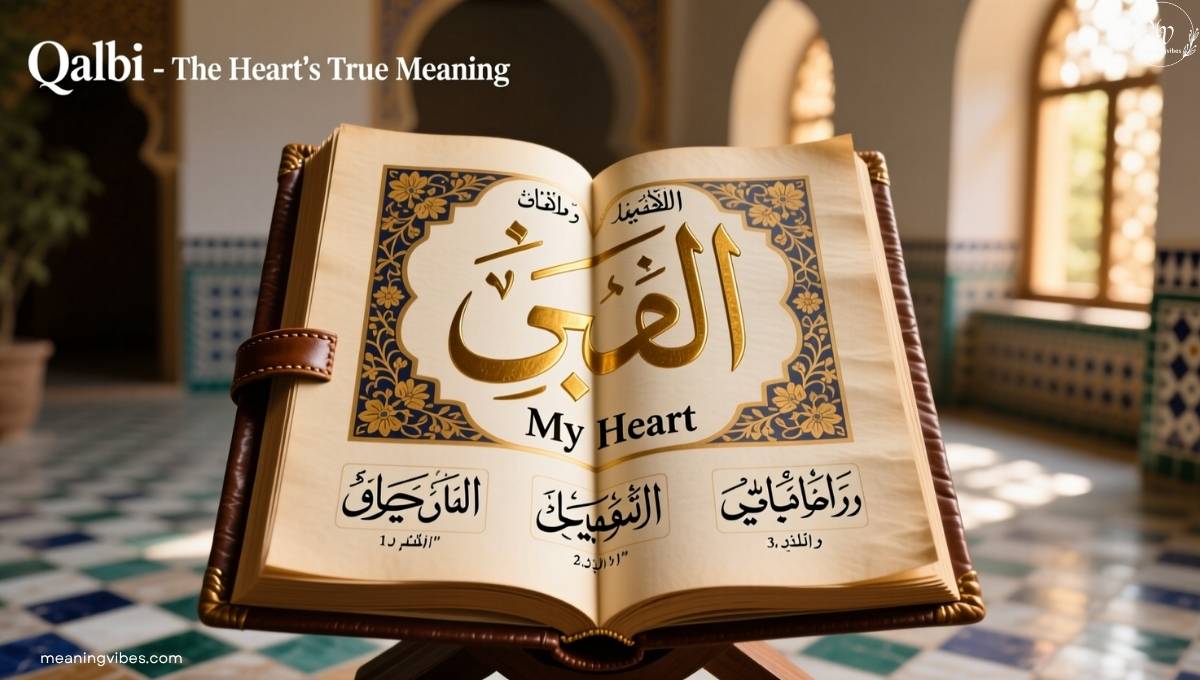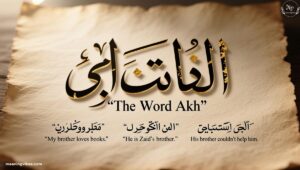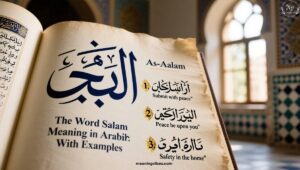Have you ever heard someone say “ya qalbi” in an Arabic song and wondered what it really means? Many people feel drawn to its warmth but don’t fully understand the qalbi meaning. Whether it’s qalbee meaning or the meaning of qalbi in everyday talk, these words express deep affection. Exploring the qalbi meaning in Arabic reveals how emotions come alive in this beautiful language.
This blog will help you uncover the Qalbi Meaning in Arabic, its origin, and how it’s used in real life. You’ll also learn the true ya qalbi meaning and the subtle difference between qalbi and qalbee. By the end, you’ll see why this word holds such emotional power in Arabic expressions of love and care.
The Meaning of “Qalbi” in Arabic
The Qalbi Meaning in Arabic is “my heart.” It comes from the noun qalb (قلب), which means “heart.” When the suffix -i is added, it becomes qalbi (قلبي), showing possession , my heart.
Pronunciation: qal-bee (قَلْبِي).
Common Variations:
- Ya qalbi (يا قلبي) – means “Oh my heart,” often said to show affection or sympathy.
- Qalbee (قلبي) – a softer or dialectal form, used in casual speech like Egyptian Arabic.
The meaning of qalbi carries deep emotion. It’s often heard in love songs, poetry, and friendly expressions where people speak from the heart.
Linguistic Root and Grammatical Usage
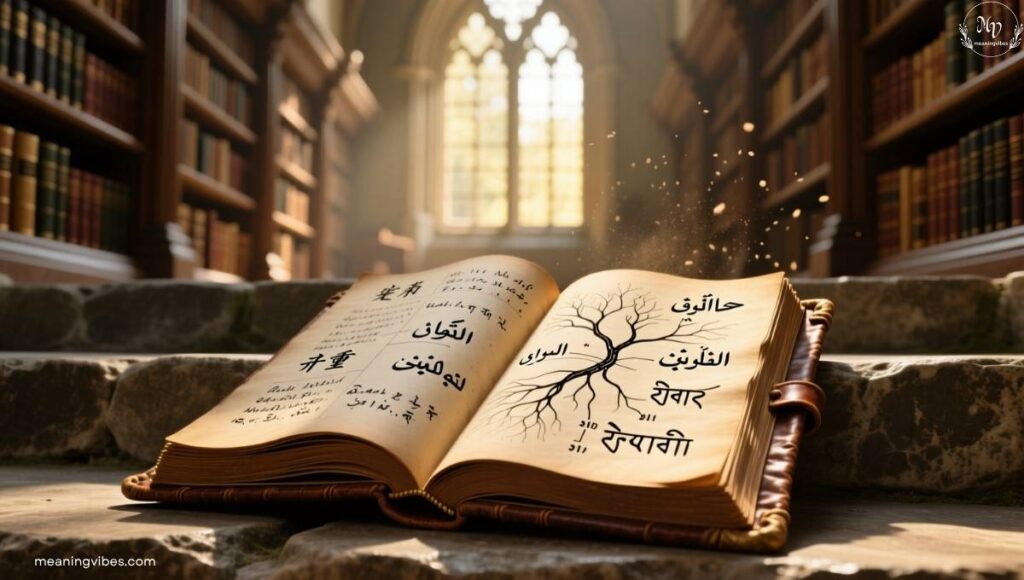
The Qalbi Meaning in Arabic comes from the triliteral root Q–L–B (ق–ل–ب), which links to ideas of the heart, emotion, and change. This reflects the way feelings can shift or turn inside the heart.
Grammatical Forms:
- Qalb (قلب): Heart (singular, base form).
- Qalbi (قلبي): My heart (possessive form).
- Quloob (قلوب): Hearts (plural).
In Arabic grammar, possession is made by adding suffixes to nouns. For example:
- Qalbi = My heart
- Qalbuka = Your heart (masculine)
- Qalbuki = Your heart (feminine)
Understanding this pattern helps Arabic learners grasp both emotion and grammar together.
Examples of “Qalbi” in Arabic Sentences
| Arabic | Transliteration | English Translation |
| قَلْبِي مَعَكَ | Qalbi ma‘aka | My heart is with you |
| يَا قَلْبِي، لَا تَحْزَنْ | Ya qalbi, la tahzan | Oh my heart, don’t be sad |
| قَلْبِي يَنْبِضُ لَكَ | Qalbi yanbidu laka | My heart beats for you |
These examples show how the qalbi meaning in Arabic appears in emotional and everyday situations. When someone says ya qalbi, it’s often a gentle way to comfort or show love. The qalbee meaning stays consistent , it always connects to the feeling of warmth and closeness.
Spiritual Meaning of “Qalbi” in Islam
In Islam, the heart (qalb) is more than an organ. It’s the center of faith and intention. Scholars say that when the qalb is pure, a person’s soul and deeds are pure too.
This makes the meaning of qalbi especially special, “my heart” means the part of you that feels, believes, and connects with God. It’s a word that reminds believers to guard their hearts with sincerity.
Cultural and Quranic Significance of “Qalbi”
In Arabic culture, the Qalbi Meaning in Arabic symbolizes more than a body part , it represents the soul, emotion, and sincerity. It’s common to hear ya qalbi meaning in songs, films, and daily conversation to express tenderness or deep care.
In the Quran, the root Q-L-B appears many times, referring to the heart as the center of understanding and faith. It highlights how emotions and spirituality are closely connected.
Quranic Reflection (Summary):
The heart (qalb) is mentioned as a source of truth and guidance. Those who have soft, aware hearts are considered spiritually alive.
This shows how the meaning of qalbi blends emotional and spiritual depth beautifully in Arabic.
Qalbi in Everyday Life and Language
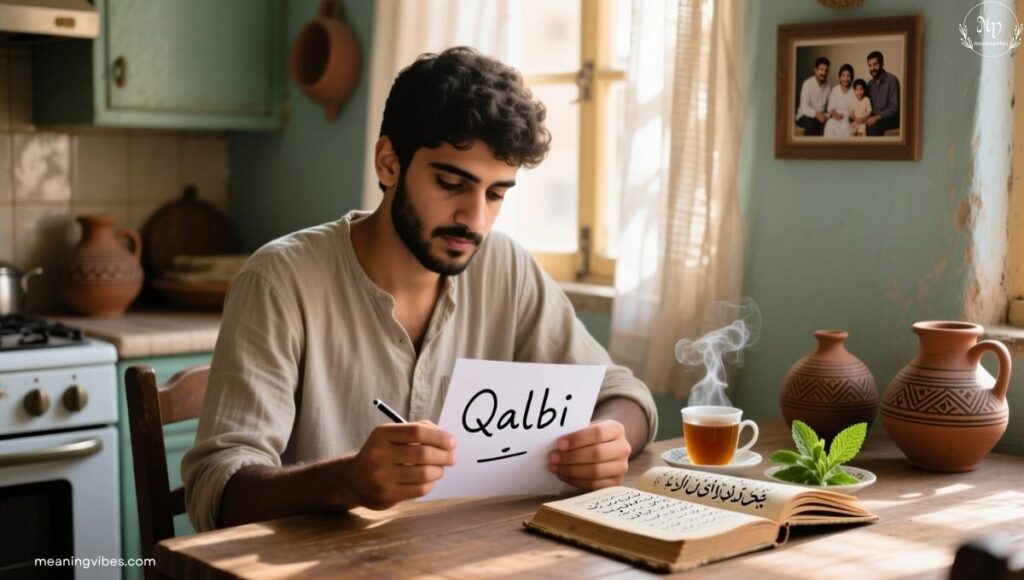
The Qalbi Meaning in Arabic appears naturally in daily conversation. It’s a phrase of care and comfort used between family and friends. You might hear a mother say ya qalbi to her child or friends use it affectionately.
In popular culture, the qalbi meaning appears in Arabic songs and dramas, symbolizing love and emotional expression. It’s also a popular word among learners who enjoy Arabic phrases full of feeling and charm.
Common Misunderstandings or Mistakes
Many beginners mix up qalb and qalbi.
- Qalb means “heart” (general).
- Qalbi means “my heart” (possessive).
Another common confusion comes from dialects:
- Alby or qalbee are used in Egyptian or Levantine Arabic, while qalbi is more formal.
Remembering these small differences makes it easier to use the Qalbi Meaning in Arabic correctly in conversation.
How to Use “Qalbi” in Conversations
Using qalbi makes your Arabic sound natural and friendly. You can use it in many situations:
- To comfort: Ya qalbi, la tahzan — “Oh my heart, don’t be sad.”
- To express love: Qalbi ma‘aka — “My heart is with you.”
- To praise: Ya qalbi, anta ra’i‘ — “My heart, you’re amazing.”
Learning these helps you express emotion like a native speaker. That’s why understanding the Qalbi Meaning in Arabic is so valuable for learners.
Why You Should Learn “Qalbi”
Learning the Qalbi Meaning in Arabic is more than memorizing vocabulary , it’s about feeling the language. Knowing words like ya qalbi meaning helps express emotion naturally, whether you’re speaking, reading, or listening to Arabic music.
It also deepens understanding of Arabic’s cultural and poetic side. By mastering the meaning of qalbi, you connect emotionally with how native speakers communicate love, care, and kindness.
How the Qalbi Meaning in Arabic Reflects Culture
The Qalbi Meaning in Arabic reflects how emotions are shared in Arabic culture. It’s common to hear it in songs, poetry, or friendly talk. Arabs use ya qalbi meaning to show closeness, just like “my dear” in English. Understanding this phrase gives learners a small window into Arabic kindness and connection. It proves that the meaning of qalbi isn’t just linguistic,it’s cultural.
Why the Qalbi Meaning in Arabic Matters to Learners
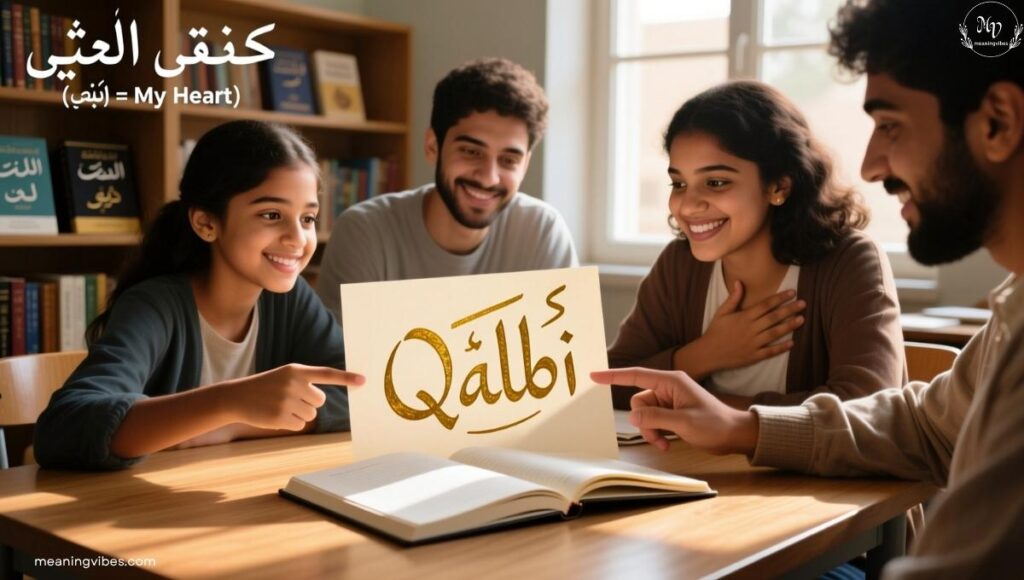
For students of Arabic, knowing the Qalbi Meaning in Arabic adds life to the language. It’s one of those phrases that make conversation feel real and human. Understanding the qalbi meaning helps learners connect emotionally, not just memorize words. Whether in class or online, learning qalbee meaning gives a stronger bond with the Arabic-speaking world and its expressions of love.
Frequently Asked Questions
What is the Qalbi Meaning in Arabic?
The Qalbi Meaning is “my heart,” a word expressing love, care, and deep emotion.
How do you pronounce the Qalbi Meaning in Arabic?
You pronounce Meaning in Arabic as “QAL-bee,” with a soft “Q” and clear “L” sound.
What does ya qalbi mean in daily conversation?
In daily talk, ya qalbi meaning refers to affection, similar to saying “oh my heart” lovingly.
Why is the Qalbi Meaning in Arabic important to learn?
Learning the Qalbi Meaning helps you understand emotional phrases and cultural expressions more personally.
Is there a difference between qalbi and qalbee in Arabic?
Both mean “my heart,” but the Qalbi Meaning in Arabic sounds more classical than qalbee in speech.
Conclusion
Understanding the Qalbi Meaning in Arabic helps you feel the emotion behind this beautiful word. The qalbi meaning shows love, care, and closeness in every culture. When someone says ya qalbi, they mean “oh my heart,” expressing deep affection. Knowing the qalbi meaning in Arabic connects you to real emotions and makes Arabic sound more personal and heartfelt.
The meaning of qalbi goes beyond language. It’s a symbol of warmth and emotion shared in words and songs. Many learners explore qalbee meaning to understand how people express love in Arabic. When you learn the Qalbi Meaning in Arabic, you also learn a piece of the culture’s soul. It’s more than a translation,it’s a feeling that brings language and heart together beautifully.

I’m the creator of meaningvibes.com, sharing positivity and purpose for over 3 years. With 50+ happy clients, I help people and brands find the right words, deep meanings, and good vibes that truly connect.
